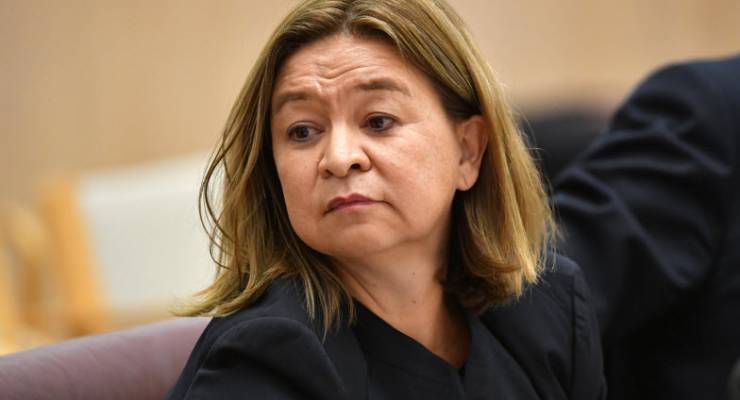
Well, ABC managing director Michelle Guthrie promised to swing the axe. Today she has, announcing a 20% “reduction” in management across the public broadcaster, while also promising to address “duplication in support roles”.
“It is expected that … 150 to 200 staff will leave the ABC by June 30, 2017,” according to this morning’s press release.
We can’t say we didn’t see it coming. As Guthrie said in her staff memo yesterday: “In my conversations with staff, I have made it clear that 2017 will be a year of action and change.”
For the people who are the ABC’s fans and users, 2017 will therefore be a time of disruption and change. No doubt the on-air look will change (yet another set of meaningless promos). New staff will be appointed, new creatives will arrive and new programs will emerge in 2018. Knowing a couple of the people involved, the changes in personnel will be for the good. And the Friends of the ABC can’t really be complaining about the loss of support and other jobs when money will be (hopefully) diverted into new programming, after the large redundancy bill is paid for.
But of greater interest is that the ABC is finally joining Ten, Nine, Seven, Foxtel and Fox Sports among the victims of streaming video, the net and social media (Facebook especially). In the past couple of weeks, ASIC has forced Seven, Nine and Pacific Star Network to make around $340 million in asset impairments for the December half. Seven in particular has another round of cuts to come in August. Foxtel’s value has been written down by US$301 million (nearly A$400 million). Fox Sports faces a possible impairment write down of up to US$500 million mid year. Prime Media and Southern Cross took impairments a year or so ago. Seven West had a big round of cuts 18 months or so ago.
Fairfax took nearly $1 billion a year ago and more a couple of years before that. News Corp (besides possible more cuts at Foxtel and Fox Sports in the next year) faces cuts of US$1.9 billion in its goodwill in the next year. That was after News Corp Australia’s long life assets took a US$227 million whacking. And shortly the Ten network will reveal another big write-off after it warned of a surprise profit this year rather than a small loss. In fact, if the ABC were a normal media organisation with intangibles dominating its balance sheet, they would have been written down heavily in the last three years, like all other legacy media.
The point about this roll call is that while many see the cuts the ABC has suffered in recent years as a case of the right wing getting square for the ABC’s perceived leftiness, the fact is, if you were to look outside the ABC, you will see newspaper and magazine sales are sliding, with Fairfax having resisted a decision to close its Monday-to-Friday editions of the SMH and The Age in Melbourne (which would have been a far greater blow to the Australian media than today’s cuts at the ABC). You would have also noted the cuts at the other networks — much quieter, and at News Corp and Foxtel. All up, losses from the commercial media in the past couple of years would be above 2000 full- and part-time people. And far more brutal. Seven West Media management boasted on last month’s analyst call that the company had cut staff at its contracting Pacific Magazines group by 20% since last October. Commercial media revenues are, in many cases, lower than they were two or three years ago.
Today’s cuts at the ABC and reshuffles are the modern media reality catching up with the ABC; legacy media has contracted sharply since the last cuts in 2014 and the ABC is as much a legacy media organisation as News Corp Australia, Foxtel, Seven West or the Ten network. If people object to these cuts, then crowd fund the ABC, but be prepared to make it an enduring funding model, that lasts a number of years because there will be no let up in the pressures. And when clients of Centrelink are having benefits cuts, or being forced to repay money, or having their reputations trashed by incompetent algorithms and dud managers, and families are having benefits cut, does the funding of the ABC matter as much?








On that last sentence, “…does the funding of the ABC matter as much?”:
The ABC’s funding, per se, might not be so significant, but, having an adequately funded, non-commercial, independent, and disinterested prominent news organisation to report on all those other matters is a HUGE issue! Without this “balancing item”, we will never escape the althernative universe of “alternative facts”.
Thoroughly agree. It’s vital to have an independent national broadcaster with sufficient resources to operate effectively along with setting the bar.
One area we wouldn’t object to being axed ie: the promo department. The number of promos between programmes is insufferable, the constant touting has the opposite effect by actually discouraging me to tune in.
Could not have said it better ‘Needlemeyer. When it comes to Media . . . ABC is ‘the’ essential weight offsetting private, commercial interests. The public funded voice of last resort. If it were not so . . . why is it ‘for profit’ media, alongside ultra conservative politicians constantly hyperventilate when the ABC voice receives Public support?
The mere fact that the fish eyed James argues & rails as passionately as his shrivelled soul can manage against a publicly funding alternative to alternative factoids of his pere should be warning enough.
Congratulations Rupert?
“In the past couple of weeks, ASIC has forced Seven, Nine and Pacific Star Network to make around $340 million in asset impairments for the December half.” … What are “asset impairments”? And what does this have to do with the ABC?